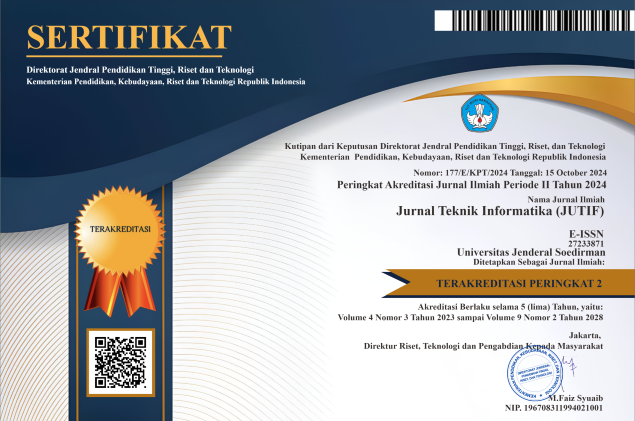IMPLEMENTATION OF CONVOLUTIONAL NEURAL NETWORK METHOD IN CLASSIFYING PANDAWA SHADOW PUPPETS
DOI:
https://doi.org/10.52436/1.jutif.2025.6.1.1851Keywords:
Classification, Convolutional Neural Network, MobilenetV2, Pandawa, Shadow PuppetAbstract
The rapid development of technology can lead to the neglect of traditional cultural and artistic aspects by humans. Nonetheless, technology has become integral in society's life. While technology facilitates humans in completing tasks, Negative impacts can also arise. One example of traditional art in Indonesia is shadow puppetry, often featuring stories of the Pandavas from the Mahabharata in puppetry performances. Characters in shadow puppetry are grouped based on character, era, and story, with similar shapes and contours. The similarity of these characters makes them difficult to distinguish and remember. Therefore, an application has been developed that can detect and classify Pandawa shadow puppet characters. The method used in this research is the Convolutional Neural Network (CNN), an effective method in deep learning for classifying data based on informational context The hope is that this application will not only introduce Indonesian culture through Pandawa shadow puppet characters but also provide a high level of accuracy in its classification results. Through the conducted training procedure, the developed model showed an accuracy rate of 95.70%. Furthermore, result verification through the use of a confusion matrix confirmed an accuracy level reaching 88%.
Downloads
References
BPS, “Statistik Sosial Budaya Indonesia 2021,” 04200.2205. [Online]. Available: https://www.bps.go.id/id/publication/2022/06/30/6a2dabc16d556ab9d075f918/statistik-sosial-budaya-2021.html
M. Z. Alfaqi, “Eksistensi Dan Peroblematika Pelestarian Wayang Kulit Pada Generasi Muda Kec. Ringinrejo Kab. Kediri,” J. Praksis dan Dedik. Sos., vol. 5, no. 2, p. 119, 2022, doi: 10.17977/um032v5i2p119-128.
I. Nurfuadi, “Rancang Bangun Media Pembelajaran Pengenalan Budaya Indonesia Berbasis Android Menggunakan Phonegap,” UIN Alauddin Makassar, Makassar, 2017.
D. Irfansyah, M. Mustikasari, and A. Suroso, “Arsitektur Convolutional Neural Network (CNN) Alexnet Untuk Klasifikasi Hama Pada Citra Daun Tanaman Kopi,” J. Inform. J. Pengemb. IT, vol. 6, no. 2, pp. 87–92, 2021, doi: 10.30591/jpit.v6i2.2802.
S. Styawati, F. Ariany, D. Alita, and E. R. Susanto, “Pembelajaran Tradisional Menuju Milenial : Pengembangan Aplikasi Berbasis Web Sebagai Penunjang Pembelajaran E-Learning Pada Man 1 Pesawaran,” J. Soc. Sci. Technol. Community Serv., vol. 1, no. 2, pp. 10–16, 2020, doi: 10.33365/jsstcs.v1i2.816.
A. R. Muslikh, D. R. I. M. Setiadi, and A. A. Ojugo, “Rice Disease Recognition Using Transfer Learning Xception Convolutional Neural Network,” J. Tek. Inform., vol. 4, no. 6, pp. 1535–1540, 2023, doi: 10.52436/1.jutif.2023.4.6.1529.
D. E. Goldberg and J. H. Holland, “Genetic Algorithms and Machine Learning,” Mach. Learn., vol. 3, pp. 95–88, 1988.
F. F. Maulana and N. Rochmawati, “Klasifikasi Citra Buah Menggunakan Convolutional Neural Network,” J. Informatics Comput. Sci., vol. 1, no. 02, pp. 104–108, 2020, doi: 10.26740/jinacs.v1n02.p104-108.
K. Wisnudhanti and F. Candra, “Metode Convolutional Neural Network dalam Klasifikasi Citra Tiga Tokoh Wayang Pandawa,” JOMFTEKNIK, vol. 7, no. 2, pp. 1–5, 2020.
M. A. R. Yudianto, Kusrini, and H. Al Fatta, “Analisis Pengaruh Tingkat Akurasi Klasifikasi Citra Wayang dengan Algoritma Convolutional Neural Network,” J. Teknol. Inf., vol. 4, no. 2, pp. 182–190, 2020.
A. P. Wibawa, W. A. Y. Pratama, A. N. Handayani, and A. Ghosh, “Convolutional Neural Network (CNN) to determine the character of wayang kulit,” Int. J. Vis. Perform. Arts, vol. 3, no. 1, pp. 1–8, Jun. 2021, doi: 10.31763/viperarts.v3i1.373.
D. P. Prabowo, D. I. I. Ullumudin, and R. A. Pramunendar, “Prototipe Aplikasi Pengenalan Wayang Kulit Menggunakan CNN Berbasis VGG16,” 2021.
A. S. S. Pratama, A. P. Wibawa, and A. N. Handayani, “Convolutional Neural Network (CNN) Untuk Menentukan Gagrak Wayang Kulit,” J. Mnemon., vol. 5, no. 2, pp. 98–102, 2022, doi: 10.36040/mnemonic.v5i2.4671.
C. L. Nazalia, “Implementasi Algoritma Convolutional Neural Network untuk Deteksi Hama di Tanaman Sawi Hijau,” Institut Teknologi PLN Jakarta, Jakarta, 2022.
Y. H. Natbais and A. B. S. Umbu, “Aplikasi Deteksi Penyakit pada Daun Tomat Berbasis Android Menggunakan Model Terlatih Tensorflow Lite,” TEKNOTAN, vol. 17, no. 2, p. 83, Aug. 2023, doi: 10.24198/jt.vol17n2.1.
M. Sokolova and G. Lapalme, “A systematic analysis of performance measures for classification tasks,” Inf. Process. Manag., vol. 45, no. 4, pp. 427–437, Jul. 2009, doi: 10.1016/j.ipm.2009.03.002.


























